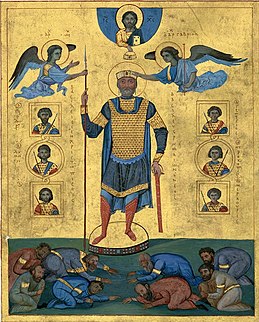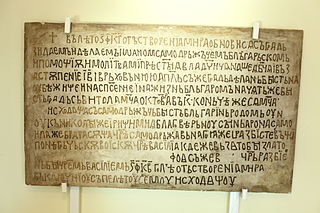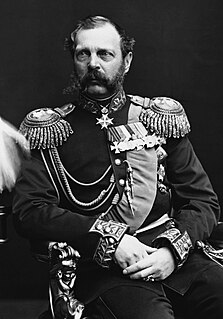
Basil II, nicknamed the Bulgar Slayer, was a Byzantine Emperor from the Macedonian dynasty whose effective reign—the longest of any Byzantine monarch—lasted from 10 January 976 to 15 December 1025. He had been associated with the throne since 960 as a junior colleague to a succession of senior emperors: his father Romanos II, his step-father Nikephoros II Phokas, and John I Tzimiskes. In addition to these emperors, Basil's influential great-uncle Basil Lekapenos held power for several decades until he was overthrown in 985. From 962, Basil II's brother Constantine, who succeeded him as Constantine VIII, was nominal co-emperor.

Andronikos IV Palaiologos, often Latinized as Andronicus IV Palaeologus, was the eldest son of Emperor John V Palaiologos. Appointed co-emperor since 1352, he had a troubled relationship with his father: he launched a failed rebellion in 1373, usurped the throne in 1376–1379, and remained engaged in a bitter struggle with John V until his death in 1385. This civil war depleted Byzantium's scarce resources and greatly facilitated the Ottoman conquest of the Balkans, most notably through the cession of Gallipoli by Andronikos.

Ivan Alexander, also sometimes Anglicized as John Alexander, ruled as Emperor (Tsar) of Bulgaria from 1331 to 1371, during the Second Bulgarian Empire. The date of his birth is unknown. He died on 17 February 1371. The long reign of Ivan Alexander is considered a transitional period in Bulgarian medieval history. Ivan Alexander began his rule by dealing with internal problems and external threats from Bulgaria's neighbours, the Byzantine Empire and Serbia, as well as leading his empire into a period of economic recovery and cultural and religious renaissance.

Medven Glacier is a 2.5 km long and 1.5 km wide glacier on Ioannes Paulus II Peninsula, Livingston Island in the South Shetland Islands, Antarctica situated east of Etar Snowfield, south of Urdoviza Glacier and north of Berkovitsa Glacier. It is bounded by the east slopes of Oryahovo Heights and drains eastwards into Prisoe Cove, Hero Bay between Remetalk Point and Agüero Point. Bulgarian mapping in 2005 and 2009.

Tundzha Glacier is a glacier on Livingston Island in the South Shetland Islands, Antarctica situated east-southeast of Berkovitsa Glacier, west of Saedinenie Snowfield, northwest of Pimpirev Glacier, north of Kamchiya Glacier and east-northeast of Verila Glacier. It is bounded by Snow Peak to the west, Teres Ridge to the east and the glacial divide between the Drake Passage and Bransfield Strait to the south. The glacier extends 7.5 nautical miles in east-west direction and 2.4 nautical miles in the north-south direction, and drains northwards into Hero Bay between Avitohol Point and Siddins Point.

Verila Glacier on Livingston Island in the South Shetland Islands, Antarctica is situated southeast of southern Etar Snowfield, southwest of Berkovitsa and Tundzha Glaciers, and west of Kamchiya Glacier. It is bounded by Rotch Dome to the west, Casanovas Peak and Snow Peak to the north, and Ustra Peak to the southeast. The glacier is roughly crescent-shaped, extending 7 nautical miles in an east-west direction and 2 nautical miles in a north-south direction, and drains southwards into Walker Bay, Bransfield Strait between John Beach and Liverpool Beach at Hannah Point. The glacier's bedrock is connected to Kaliman Island in Walker Bay by a 600 m long moraine tombolo. The area was visited by 19th century British and American sealers.

In the medieval history of Europe, Bulgaria's status as the Bulgarian Empire, wherein it acted as a key regional power occurred in two distinct periods: between the seventh and eleventh centuries, and again between the twelfth and fourteenth centuries. The two "Bulgarian Empires" are not treated as separate entities, but rather as one state restored after a period of Byzantine rule over its territory. Bulgaria is one of the few historic states and nations whose economy and society were never based on slavery, and slavery never played an important role in Bulgarian statehood development and wealth.

Berkovitsa Glacier is a glacier on Livingston Island, Antarctica situated east of Etar Snowfield, south of Medven Glacier, west-northwest of Tundzha Glacier and north-northeast of Verila Glacier. It is bounded by the southeastern slopes of Oryahovo Heights and the northwestern slopes of Snow Peak. It extends 4km in southeast-northwest direction and 2.8km in northwest-southeast direction, and drains northeastwards into Hero Bay between Avitohol Point and Remetalk Point.
Rugby union in Bulgaria is a minor but growing sport. Bulgaria is ranked 90th worldwide by the International Rugby Board (IRB) as of 8 October 2007. There are 3,026 Bulgarian rugby players.

The komes ("count") Nicholas Bulgarian: Никола was a local ruler in Bulgaria, probably of Armenian origin, and progenitor of the Cometopuli dynasty.

OFC Kom is a Bulgarian football club from the town of Berkovitsa, currently playing in the A RFG Montana, the fourth level of Bulgarian football.
Ivan the Russian was a 14th-century Bulgarian military leader of Russian origin who served Bulgarian tsars Michael Shishman and Ivan Alexander. Prior to joining the armed forces of the Second Bulgarian Empire, Ivan the Russian may have been a military commander in the service of the Hungarian governor of Severin.
Alexander, subsequently Iskender, was the eldest son of Bulgarian tsar Ivan Shishman. Alexander was possibly made co-emperor by his father before the Ottoman conquest of the Tarnovo Tsardom in 1395. After the subjugation of Ivan Shishman's realm and his execution, Alexander converted to Islam to avoid his father's fate. He was made governor of Samsun, where he remained until 1402. From 1413 to 1418, when he was killed in a battle against a local rebel, Alexander was in charge of Smyrna (İzmir).
With Children at the Seaside is a Bulgarian anthology comedy film released in 1972, directed by Dimitar Petrov, starring Georgi Partsalev, Petar Peychev and Ivaylo Dzhambazov. The screenplay is written by Mormarevi Brothers.
The Toplica Uprising was a Serb rebellion in 1917 carried out by Serbian guerrillas (Chetniks) in the Toplica District against the Bulgarian occupation force in the eastern part of the Kingdom of Serbia, occupied since October 1915. The rebellion lasted from 21 February to 25 March 1917.

Alexander II was the Emperor of Russia from 2 March 1855 until his assassination on 13 March 1881. He was also the King of Poland and the Grand Duke of Finland.











